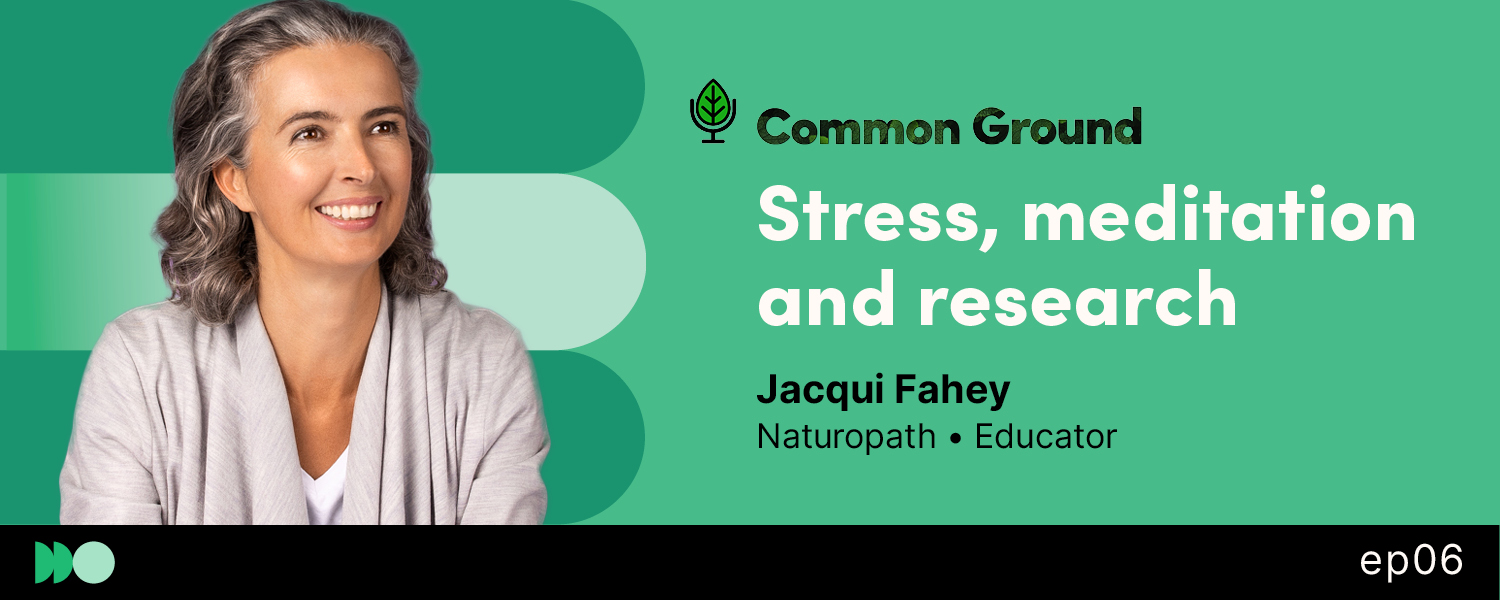
Listen on Amazon music | Apple Podcasts | Google Podcast | Spotify
Transcript
Jacqui Fahey (00:09):
Welcome to Common Ground, a podcast series discussing new research and interesting projects in the field of complementary medicine. Hello, my name is Jacqui Fahey, Head of Education at vital.ly.
Today I am going to be discussing the basics of meditation, along with some very inspiring research on how meditation may potentially improve various areas of health such as the symptoms of pain, helping extinguish fearful associations, along with some further recent research on meditation apps and what studies are showing regards the 4 elements most styles of meditation have in common.
Interestingly and perhaps not surprisingly, our collective attention span has shortened by around one third over the past fifteen years (1).
With so many demands on our time and minds, it can take conscious effort to take a moment and allow ourselves the time out. Even when we do make time, many can be stuck on how to actually do this.
(01:10):
The practice of meditation has been recognised as a key method that may help taking some downtime and to reduce stress, this has also been confirmed in a recent meta-analysis just released this year that stated meditation may improve some, but not all, attentional processes (2).
So let’s talk briefly on the impact of stress. Acute stress responses in young, healthy individuals typically do not impose a health burden. However, if the threat is unrelenting, particularly in older or unhealthy individuals, the long-term effects of stressors can damage health. Ongoing chronic stress can have affects on our body, our mood and behaviour. The relationship between psychosocial stressors and disease is affected by the nature, number, and persistence of the stressors, as well as by learned patterns of coping, psychosocial resources and the individual’s biological vulnerability (i.e., genetics, constitutional factors) (3).
(02:22):
Meditation is a time tested technique that has been around for millennia. The word meditation stems from meditatum, a Latin term that means ‘to ponder.’ Some have called it a form of mental exercise. The earliest origins of meditation date from about 1500 years BCE, with Vedic schools in India, also Taoist and Indian Buddhist traditions. There are multiple references across different cultures and religions to meditative-like practices.Researchers agree that the practice probably began many thousands of years ago, before the birth of modern civilization.
There are many styles and techniques to suit and there is no right or wrong to it, it’s a matter of trying out a few and seeing what works best for you. The research I shall be sharing today will relate to certain types of meditation and is not an exhaustive list of all practices.
(03:24):
So what is meditation? Meditation encompasses a collection of mental training practices that involve self- regulating one’s attention toward a chosen object of awareness from one moment to the next. It is a conscious mental process that induces physiological processes associated with parasympathetic dominance (the relaxation response). Regular inducing of the relaxation response is associated with reduced stress and negative emotions (4). Neurophysiological mechanisms include improvements in vagal tone, significantly increased salivary oxytocin levels – a hormone often called the love hormone and activation in areas of the prefrontal cortex, the region of the brain involved in the orchestration of thoughts and actions in accordance with internal goals (4). The relaxation response is a physical state of deep rest that changes a person's physical and emotional responses to stress (5). Researcher Herbert Benson, of Harvard Medical School and the Benson-Henry Institute for Mind Body Medicine, discovered the relaxation response's power to reduce stress in the 1960s.
(04:51):
His subsequent research found that the approach is not so different from what people have done for centuries through prayer, chanting and repetitive motion. Benson has stated "You can use the mind like you would use a drug," he said. "This should empower you in your practices." His latest research, published in the online journal Public Library of Science ONE , suggests that practicing the relaxation response can actually lead to genomic activity changes (6). In the study, his team of researchers looked at how the relaxation response affected each of the body's 40,000 genes and found that, compared with a control group, those who regularly used the relaxation response induced an anti-oxidant and anti-inflammatory changes that counteracted the effects of stress on the body (6).
There are many types of meditation, but research has shown, most styles have four elements in common (7):
- Choose a quiet location, keeping distractions to a minimum
- Get yourself into a comfortable posture such as sitting, lying down or walking
- Have a focus of attention such as your breath, chosen word or set of words or an object
- Approach it with an open mindset, letting go of distractions, allowing them to pass without judgement
As Swami Muktananda has shared “Your goal is not to battle with the mind, but to witness the mind.”
(06:29):
Some people may choose to work with or without a meditation teacher. There are many meditation books that have been written over the years with Some texts being more instructional and focus on exactly what you ideally do in your meditation practice; such as how to sit, how to breathe, what mantra to chant, and various other helpful hints.
(06:51):
Some of the latest research on meditation and its benefits include (8,9, 10, 11):
In 2018, Harvard researchers found that patients who meditated over an 8 week period experienced a change in the expression of 172 genes that regulate inflammation, circadian rhythms and glucose metabolism. In turn, this was linked to a meaningful decrease in their blood pressure.
The mind-body practices were found to elicit the relaxation response and were demonstrated to reduce blood pressure in essential hypertension and suggested that they may be an adjunct to antihypertensive drug therapy. Although the study did not include a comparison group of non-meditators, the authors considered it to be an important milestone. Researchers compared a group of 20 Zen meditation experts with 20 healthy matched comparison participants who had not previously meditated. Results showed that the expert meditators had significantly longer median telomere lengths as well as lower percentages of short telomere in their cells than the non-meditator comparison group. Telomeres are segments of the DNA that occurs at the ends of chromosomes. They are an essential part of human cells that shorten as our cells age.
Another recent study in 2019, with 42 participants found mindfulness-based meditation was shown to foster stress resilience and appears to help extinguish fearful associations. The researchers found that changes in the brain after mindfulness training were associated with enhanced ability to recall the safety memory , and thus respond in a more adaptive way. The ‘safety memory’ is where we create a new memory to replace the original fearful memory.
The study's senior author, Sara Lazar noted, "Fear and anxiety have a habitual component to them—the memory of something that provoked fear in the past will trigger a habitual fear response when we are reminded of the event, even if there is no direct threat at the present.
The data indicate that mindfulness can help us recognize that some fear reactions are disproportional to the threat, and thus reduces the fear response to those stimuli. Mindfulness can also enhance our ability to remember this new, less fearful reaction, and break the anxiety habit".
A further systematic review and meta-analysis of 30 randomised controlled trials on the effects of mindfulness meditation on chronic pain found statistically significant improvements in mental health-related quality of life, physical health-related quality of life, and depression.
(09:59):
Just as a little side definition there that I've mentioned a couple of studies prior, that were referring to a meta-analysis and so what is this? This is where statistical analysis combines the results of multiple scientific studies.
(10:16):
Some examples of different styles of meditation include mindfulness meditation. And this is just a, some of the research I've just mentioned before those studies were based on mindfulness meditation. So this type of meditation refers to the nonjudgmental awareness of the present moment by observing and accepting our unfolding experiences, our emotions, thoughts, and physical sensations.
Other styles of meditation include visualization, guided versus unguided meditation, transcendental meditation, which refers to a specific form of silent meditation and deep breathing techniques, such as circle breathing and counting.
Digital delivery is gaining traction as a way of increasing the accessibility of psychological treatments (12).
Mindfulness meditation apps are becoming increasingly popular tools to improve wellbeing and mental health among the general population (13). A recent meta-analysis concluded there were small or medium effects of mindfulness apps to control conditions for perceived stress, depression and anxiety, life satisfaction, quality of life, burnout and psychological wellbeing (13). Examples of some of the meditation apps that one may use include Headspace, Smiling mind, Waking up app calm and well one I particularly like the sounds of, 10% happier.
(11:51):
To conclude this podcast today, it is important to note, meditation practices are not for everyone and consideration is needed for individual differences and awareness of some of the adverse effects in its application in a lay context. Meditation is generally considered to be safe for healthy people. People with physical limitations may not be able to participate in certain meditative practices involving movement. People with physical health conditions should speak with their health care practitioners before starting a meditative practice, and make their meditation instructor aware of their condition.
(12:31):
There have been rare reports that meditation could cause or worsen symptoms in people with certain psychiatric problems. People with existing mental health conditions should speak with their health care practitioners before starting a meditative practice, and make their meditation instructor aware of their condition. Being aware of the mental health benefits of meditation may assist persons who are facing challenges in their life. It may be a useful tool to support individuals in their tolerance and response to distress as well as improving quality of life in general. All references mentioned within this podcast are available on the transcript. Thank you very much for tuning in today on Common Ground.






